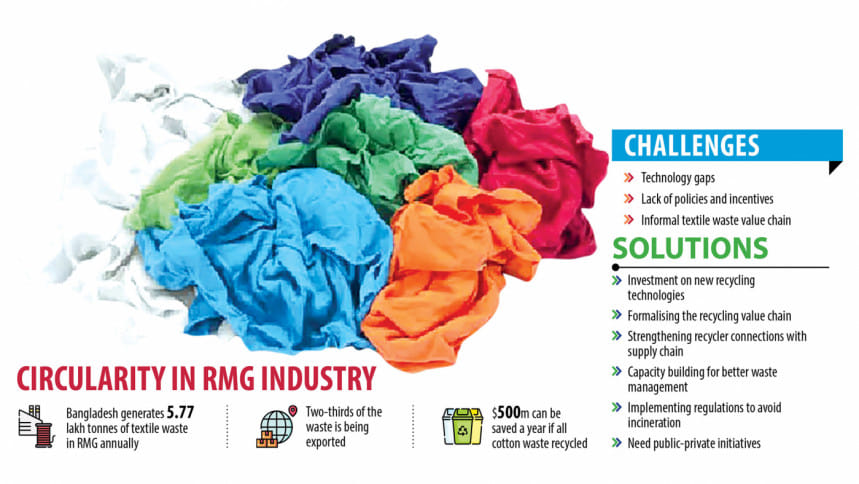Garment sector could save $500m annually by recycling cotton waste

Bangladesh could save as much as $500 million annually if the cotton waste generated by its garments sector is recycled, according to experts.
The country's garment sector currently generates 5.77 lakh tonnes of textile waste each year. Of this amount, two-thirds are exported.
"If the country recycles all the cotton waste locally, it could save $500 million annually," said Faisal Rabbi, manager of stakeholder engagement and public affairs at H&M Group.
He made this comment while delivering a presentation on behalf of Swedish textile brands at a discussion, styled "Promoting Circularity for a Sustainable RMG Industry in Bangladesh", at Sheraton Dhaka yesterday.
The event was organised by the Nordic Chamber of Commerce and Industry (NCCI) in association with Nordic embassies in Dhaka and the EU delegation.
In terms of recycling, Bangladesh's garment sector is facing challenges such as a technology gap, informal value-chain for waste, and lack of policies and incentives.
"The garment sector needs access to renewable energy and conducive policies and incentives for textile waste recycling to sustain its competitiveness," Rabbi said.
In her opening remarks, Swedish Ambassador Alexandra Berg von Linde said environmental sustainability has long been a clear and overarching priority for Nordic countries and will continue to be key in their relations with Bangladesh going forward.
She then said Nordic businesses have a long of experience in cultivating economic growth while simultaneously decoupling it from negative impacts on the environment by applying solutions that are resource-efficient and by reusing, reducing and recycling.
During the ambassadorial panel discussion, Charles Whiteley, head of the EU delegation in Bangladesh, stressed on the impact upcoming policy developments in the EU regarding circularity and textile strategy will have on Bangladesh.
He also underscored the importance for proactively addressing issues arising in the value-chain for garment items.
Speaking as chief guest, Salman F Rahman, the prime minister's adviser on private industry and investment, said global buyers usually impose several conditions for sourcing products but hardly ever negotiate prices.
"When buyers set their standard, we expect they should give our rewards or at least acceptable prices," he added.
He also stressed on increasing renewable energy sources, research and development as well as technological innovations in line with the trade and financial context of the circular economy.
Faruque Hassan, president of the Bangladesh Garment Manufacturers and Exporters Association, said the current trajectory needs to change if the country wants to create a sustainable future, and one of the key strategies to do so is through resource decoupling.
"The circular economy could build a pathway for greater environmental sustainability and economic growth," he added.
Hassan went on to say that brands are pressing them for a net-zero roadmap in line with their own strategic targets for becoming climate neutral.
But when brands set such ambitious targets, it is their responsibility to make sure that no one is left behind in the supply chain, he said.
Hassan then urged the brands to adopt strategies that include small-and-medium enterprises to ensure sustainable growth of the entire garment industry of Bangladesh.
The programme also hosted two panel discussions on "Challenges and Opportunities" and "Policies and Roadmap".
Among others, Lokman Hossain Miah, an executive chairman of the Bangladesh Investment Development Authority, Faiyaz Murshid Kazi, director general of the multilateral economic wing of the foreign ministry, and Tahrin Aman, president of the NCCI, spoke at the event.

 For all latest news, follow The Daily Star's Google News channel.
For all latest news, follow The Daily Star's Google News channel. 



Comments